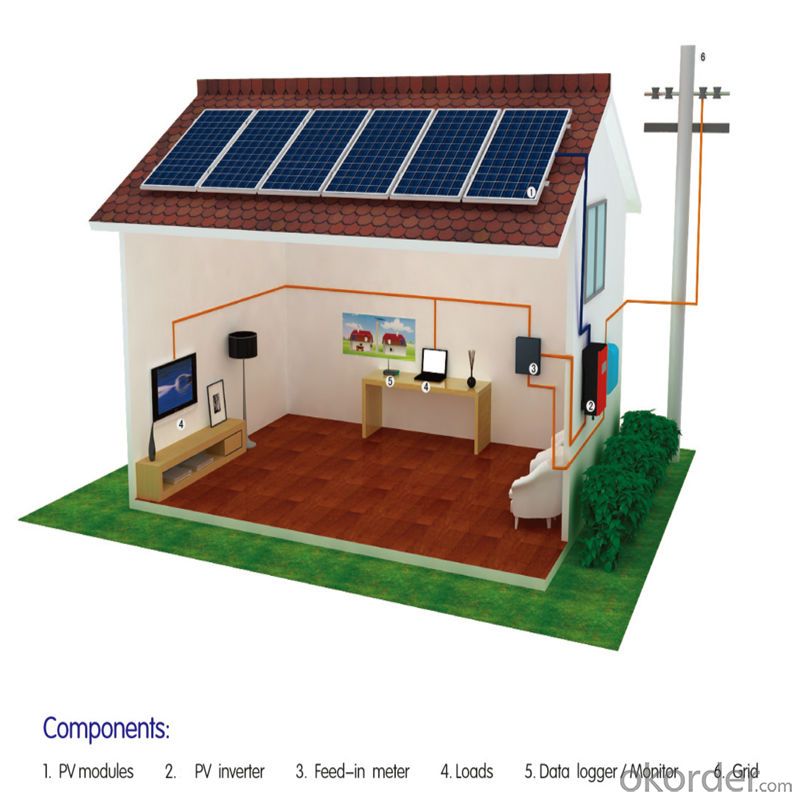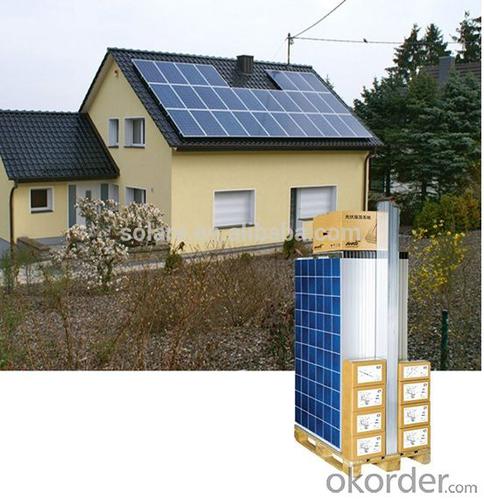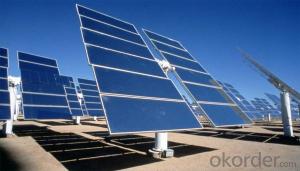Chennai Solar Energy Systems - 8kw Homeuse Grid Solar System without Battery
- Loading Port:
- Shanghai
- Payment Terms:
- TT or LC
- Min Order Qty:
- 8000 watt
- Supply Capability:
- 200000 watt/month
OKorder Service Pledge
OKorder Financial Service
You Might Also Like
Solar system advantages:
1. CE, ROHS approved.
2. High conversion efficiency, high-transmission rate.
3. Energy saving, environmental-friendly.
4. Advanced technology, strict quality control system.
5. Easy installation, safe operation, free maintenance.
6. Low MOQ, fast delivery time, long service life
| Quick Details | |||||
| Specification: | Normal | Application: | Home | Output Voltage (V): | 230~400V |
| Load Power (W): | 7800W | Solar Power (W): | 8000W | Work Time (h): | 10hours |
| Warranty: | 10years | Name: | grid solar system without battery | Model: | SLG-8KW |
| Max AC power: | 8000W | Max DC voltage: | 1000VDC | Max current: | 2*20A |
| MPPT Voltge range: | 300-800VDC | Max DC power: | 8250W | Inverter efficiency: | 98% |
| Solar panel model: | Poly solar panel 250W | ||||
| Packaging & Delivery | |
| Packaging Detail: | grid solar system without battery:Fullset system packed into cartons with pallets, 10sets can packed into 20'container, 22sets can packed into 40'container. |
| Delivery Detail: | 7-15days |
Specifications
grid solar system without battery
1)Good performance
2)High efficiency
3)Easy installation
4)Speical customs OEM
8KW homeuse grid solar system without battery
Product Description
Product Overviews:

Product Parameters:
| Solar Panel / PV Module | |
| Module type | TSP-250W |
| Rated Power | 250Wp |
| Tolerance | 0-+3% |
| Open Circuit Voltage (Voc) | 36.58V |
| Short Circuit Current (Isc) | 9.15A |
| Max.Power Voltage (Vm) | 29.5V |
| Max.Power Current (Im) | 8.47A |
| Temperature coefficients of Isc (%) | 0.10/℃ |
| Temperature coefficients of Voc(%) | -0.33/℃ |
| Temperature coefficients of Pm(%) | -0.23/℃ |
| Cell efficiency(%) | ≥17.15% |
| FF(%) | 75% |
| Working Temperature Range | -40 to +85°C |
| Max Systsem Voltage | 1000V DC |
| Max Rated Fuse Current | 15A |
| Nominal operating cell temperature (NOCT): | 47°C |
| Solar cells | 6*10 polycrystalline Cells(156*156mm) |
| Size | 1640×990×40mm |
| Weight | 20Kg |
| The front cover glass | 3.2mm high transmittance,low iron,tempered glasses |
| Frame | Anodized aluminum |
| Juntion box | Protection class IP67 Rated |
| Cbles | Length:900mm, 1*4.0mm2 |
| Standard Testing Condition | 1000W/m², Cell temperature 25°C, AM1.5, Compliance with IEC61215 ,IEC61730-1 / 2 certification standards |
| PV Grid Inverter | |
| Model | Solartec D 8000 |
| Max DC Power | 8250W |
| Max DC Voltage | 1000V |
| System Start-up Voltage | 250V |
| Nominal DC Voltage | 650V |
| PV Voltage MPPT | 300v-800V |
| Max input Current | 2*16A |
| Max input short circuit current | 2*20A |
| Number of MPPT Trackers | 2 |
| Strings of each MPPT | A:1, B:1 |
| Nominal AC Output | 8000w |
| Nominal Grid Frequency Range | 50HZ |
| Max output current | 15A |
| THD of AC current | <3% |
| Nominal grid voltage range | 230-400V(3/N/PE) |
| Adjustable Displacement Factor | 0.9 overexcited…0.9underexcited |
| Number of feed-in phase | three-phase |
| Max efficiency | 98.00% |
| Euro efficiency | 97.30% |
| Mounting Method | Wall bracket |
| Reverse Polarity Protection | Short-CircuitDiode |
| DC Switch | Integrated |
| Short-Circuit Proof | Yes |
| Grid monitoring | Yes |
| Display | LCD |
| Accessory interfaces | RS485/RS232/WIFI |
| Standard Warranty | 5years |
PV Mounting Sysstem
Material is galvanized steel or aluminum,
According to different roof and installation address , have many types for choice.
Benefits of Solar Power:
Now is a great time to go solar and harvest the power of the sun. Here is our top ten list of the benefits to installing solar power:
1, When installed, solar energy is free – no resources are consumed
2, Help to lessen our dependence on heavily polluting coal power stations
3, Fossil fuels can't last forever, future generations will appreciate the effort
4, You are gaining energy independence - add battery backup power for even greater energy security
5, The cost of electricity is only going to rise – insure against that rising cost
6, Quality solar power and water adds value and appeal to your home
7, Solar PV systems are easily upgraded in future - aim to make your house a net energy producer!
8, Solar panels offer a long lifetime of low maintenance service, maybe 30-40 years
9, Your friends will think you're great!
10, You'll feel great for doing your bit for the environment!
- Q: Solar photovoltaic system
- Analysis of economic benefits: 50kW distributed photovoltaic PV power plant total operating period: 25 years of this project on average generating capacity: the annual average generating capacity of 200kWh: 73000kWh, 25 years of total power: 1825000kWh residential electricity price: 0.55 yuan /kWh local coal-fired power benchmark price: 0.44 yuan /kWh (the case): Total investment the total investment of about 450 thousand yuan, equivalent to 9 yuan / watt.
- Q: How do solar energy systems connect to the electrical grid?
- Solar energy systems can connect to the electrical grid by means of net metering, a process that enables the system to generate and consume electricity from the grid. Excess power generated by the solar energy system is sent back to the grid and measured by a bi-directional meter, which calculates the flow of electricity in both directions. This surplus electricity is then credited to the system owner's account, effectively reversing the meter. Conversely, during times when the solar energy system is unable to meet the electricity demand, such as at night or on cloudy days, electricity is drawn from the grid to make up for the shortfall. The bi-directional meter accurately records this flow of electricity and measures the amount consumed from the grid. In summary, the connection between solar energy systems and the electrical grid facilitates the seamless integration of renewable energy into the existing power infrastructure. Net metering ensures that solar system owners can contribute excess electricity to the grid and draw from it when needed, resulting in a more efficient, reliable, and sustainable energy system.
- Q: Can solar energy systems be used in areas with limited access to solar panel manufacturers?
- Yes, solar energy systems can still be used in areas with limited access to solar panel manufacturers. In such cases, the focus would be on importing solar panels from manufacturers in other regions or countries. Additionally, efforts can be made to promote local manufacturing or assembly of solar panels to overcome the limitations and ensure the availability of solar energy systems in those areas.
- Q: What is the difference between a grid-tied and off-grid solar energy system?
- A grid-tied solar energy system is connected to the local electricity grid, whereas an off-grid solar energy system operates independently and is not connected to the grid. In a grid-tied system, solar panels are used to generate electricity from the sun, which is then converted into usable AC power through an inverter. This electricity is first consumed by the household or business where the system is installed. If the solar panels generate more electricity than is being consumed, the excess power is fed back into the grid, often resulting in a credit or payment from the utility company. During times when the solar panels are not generating enough power, electricity is drawn from the grid. This ensures a continuous and reliable power supply, with the grid acting as a backup. On the other hand, an off-grid solar energy system is designed to operate independently from the grid. It typically includes a battery bank to store excess electricity generated by the solar panels, which can then be used during times when the panels are not producing enough power. Off-grid systems also require an inverter to convert the DC power from the solar panels into usable AC power. These systems are commonly used in remote locations where connecting to the grid is costly or not feasible. The main difference between the two systems lies in their level of independence and connection to the grid. Grid-tied systems offer the advantage of being able to sell excess electricity back to the utility company, allowing for potential cost savings or even revenue generation. They also provide a reliable power supply, as grid power can be used when solar production is low. On the other hand, off-grid systems provide complete energy independence and are not reliant on the grid. However, they require careful planning and sizing to ensure sufficient power is available at all times, as there is no backup from the grid. Additionally, off-grid systems often require more complex equipment, such as batteries, to store and manage electricity.
- Q: Can solar energy systems be used in urban areas?
- Yes, solar energy systems can be used in urban areas. In fact, urban areas provide several advantages for solar energy systems, including available rooftops and vertical surfaces for solar panel installation, a dense population that can benefit from renewable energy, and reduced transmission losses due to shorter distances between energy generation and consumption. Additionally, advancements in solar technology have made it possible to integrate solar panels into various urban infrastructure, such as streetlights, bus shelters, and building facades, making solar energy systems a viable and sustainable solution in urban environments.
- Q: Are there any advancements in solar energy system technology?
- Yes, there have been significant advancements in solar energy system technology. These include improvements in photovoltaic (PV) cell efficiency, the development of more durable and flexible solar panels, and the integration of energy storage solutions. Additionally, there have been advancements in solar tracking systems, allowing panels to optimize sunlight capture throughout the day. These advancements have made solar energy more affordable and efficient, contributing to its increasing adoption worldwide.
- Q: How does solar energy impact property values?
- Solar energy can have a positive impact on property values as it is considered a desirable feature by many homebuyers. Homes with solar panels typically sell faster and at a higher price compared to similar properties without solar installations. This is because solar energy can significantly reduce or eliminate electricity costs, making the property more affordable to maintain. Additionally, solar energy contributes to a greener and more sustainable lifestyle, which is increasingly valued by homeowners.
- Q: Are solar energy systems reliable?
- Yes, solar energy systems are reliable. They have proven to be a dependable and consistent source of renewable energy, with advancements in technology making them more efficient and durable.
- Q: Can solar energy systems be installed in areas with high snowfall?
- Yes, solar energy systems can be installed in areas with high snowfall. However, it is important to consider the design and installation of the system to ensure optimal performance and prevent damage from heavy snow loads. Strategies such as mounting the panels at an angle, using snow guards, and regular snow removal can help maximize energy production in snowy conditions.
- Q: Can solar energy systems be used for transportation?
- Yes, solar energy systems can be used for transportation. Solar energy can be harnessed to power different types of vehicles, including cars, buses, boats, and even airplanes. Solar-powered vehicles use photovoltaic (PV) cells to convert sunlight into electricity, which can then be stored in batteries or used directly to power the vehicle's electric motor. Solar panels can be installed on the roof, hood, or any other suitable surface of the vehicle to capture sunlight and generate electricity. While solar-powered transportation is still relatively limited in terms of range and speed compared to traditional fossil fuel-powered vehicles, advancements in solar technology are continuously improving the efficiency and performance of these systems. Furthermore, solar energy can also be utilized in transportation infrastructure, such as solar-powered charging stations for electric vehicles, providing a sustainable and renewable alternative to traditional energy sources.
Send your message to us
Chennai Solar Energy Systems - 8kw Homeuse Grid Solar System without Battery
- Loading Port:
- Shanghai
- Payment Terms:
- TT or LC
- Min Order Qty:
- 8000 watt
- Supply Capability:
- 200000 watt/month
OKorder Service Pledge
OKorder Financial Service
Similar products
Hot products
Hot Searches
Related keywords























